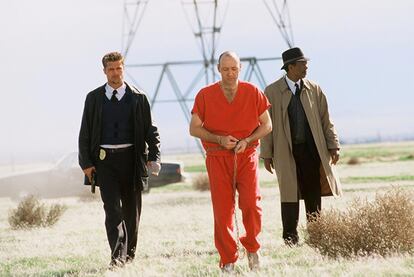Wounded masculinity and class resentment: David Fincher revisits some of his classic themes in ‘The Killer’
Starring Michael Fassbender, the director’s new film returns to its origins, to the misanthropic thrillers in which women were barely welcome.

The fact that David Fincher’s twelfth feature film, The Killer, begins with a credits sequence – something that had not happened in his filmography since The Girl with the Dragon Tattoo (2011) – is meaningful. So is that long preface intended to acquaint us with the motivations and strategies of the protagonist that is also a declaration of principles worthy of a hermit whose values are fiercely opposed to those promoted by the public sphere today. “Empathy is a weakness,” the assassin, played by Michael Fassbender, repeats to himself over and over again. “Trust no one.”
With the complicity of screenwriter Andrew Kevin Walker, who had already collaborated on Seven (1995) and, uncredited, on The Game (1997) and Fight Club (1999), Fincher returns with The Killer to his origins as a director; to the misanthropic nocturnal thrillers in which women were barely welcome while men struggled between two extremes: the fantasy of power and their practical impotence in times that had criminalized the classic masculinity embodied by the blue collar man in order to speculate, by way of the new masculinities, with the economy and the affections.
Seen in perspective, his dark debut feature, Alien 3 (1992), harbors several qualities of the later Fincher, despite its turbulent production: from the only female character, Ripley (Sigourney Weaver), turning into an icon that inspires more awe than desire, to the description of the inhabitants of planet Fiorina 161 as criminals expelled from the system, riffraff destined to survive on their own in a Neverland transmuted into Hades.

Fincher sublimates the creative interference he suffers during Alien 3 into Seven, the pinnacle of millenarian angst and a hypermoral device of sordid imagery. The real protagonist of Seven, the actual shaper of his own story, is the serial killer John Doe (Kevin Spacey), a nameless man who, armed with patience and a manic attention to detail, defeats detective David Mills (Brad Pitt), a symbol of thoughtless ambition in the service of the establishment. Through Doe, Fincher and Walker certify the failure of the 20th century big city as a repository of modernity. John Doe is the ultimate manifestation of the flâneur, that anonymous stroller that the romantic explorer of nature became, although not in the sense of intoxication that Baudelaire gave the term, but in that outlined by Edgar Allan Poe in his disturbing The Man of the Crowd (1840): the city as a mousetrap for those that were cast, through progress, into uncertainty. Their dreams of greatness have no choice but to turn into class resentment.
The director continues his exploration of these themes in The Game, a meta, Kafkaesque, nocturnal fiction about an unscrupulous banker, Nicholas Van Orton (Michael Douglas), that is psychologically returned to childhood when his younger brother gets him involved in a strange game that re-awakens the shadow of his father’s suicide. Thus, Nicholas is another lost child, an orphan whose desire for material improvement conceals a death drive, something he shares with another nameless man, The Narrator (Edward Norton) from Fincher’s most popular film, Fight Club. The Narrator will end up splitting into a doppelgänger, Tyler Durden (Brad Pitt again), to overcome the dissatisfaction of being shut out of the socioeconomic and cultural bubble of the post-Berlin Wall West: “We’re the middle children of history, man. No purpose or place. [...] We’ve all been raised on television to believe that one day we’d all be millionaires, and movie gods, and rock stars. But we won’t.”
Fight Club is above all a satire and the generational manifesto of a defeat, signed off with that mind-bending final scene that foreshadows the imminent attacks of 9/11. In a conformist sociopolitical climate, Fincher settles down with more conventional stories, although his personality remains intact. In Panic Room (2002), an exercise in post-9/11 paranoia, the villains are, again, humiliated and offended individuals, doomed to failure by the survival spirit of the privileged classes. Zodiac (2007) is a revision of Seven based on real events, where the investigators’ fear of the abyss staring back at them leads to their irrelevance and the victory of evil. And The Curious Case of Benjamin Button (2008) serves as an antithesis to the upbeat Forrest Gump (1994), that is, a somber fantasy that abstracts its protagonist from the current of history.
It is fascinating how Fincher vampirizes Mark Zuckerberg, the creator of Facebook, in The Social Network (2010), turning him into another orphan, unable to deal with his maladjustment without resorting to black magic, the illusion of control; and how in The Girl with the Dragon Tattoo and Gone Girl (2014) he drives ordinary male protagonists to project their fantasy of watching the world burn onto charismatic women, agents of the asocial.
At 60 years old, Fincher dares to personalize many of these questions in a game of mirrors. Mank (2020) is the biopic of a screenwriter that is always in the shadow of others, Herman J. Mankiewicz, that takes advantage of a script written by his own father, Jack Fincher, who died in 2003. In the director’s own words, during his childhood Jack was a victim of an abusive relationship with his father, which was alleviated by a love for cinema that he passed down to him.
With The Killer, Fincher evokes the thematic abstraction of his early work and reiterates numerous authorial motifs, including his scathing critique of late capitalism and its corporate apostles. With two differences: on one hand, the murderer does not exhibit moral superiority, but rather an icy pragmatism, with which Fincher and Walker prove that they have not lost their clinical eye when it comes to revealing the nature of the present behind the appearances. On the other hand, after lecturing us about his philosophy of life, the killer fails in his initial mission due to a rookie mistake, compared to the omnipotence of John Doe or Tyler Durden. This nod to the unpredictability of existence, by a filmmaker that has shared with many of his characters the attribute of being a control freak, suggests maturity – or resignation. Depending on the eye of the beholder.
‘The Killer.’ David Fincher. Released in theaters and available from this Friday on Netflix.
Sign up for our weekly newsletter to get more English-language news coverage from EL PAÍS USA Edition
Tu suscripción se está usando en otro dispositivo
¿Quieres añadir otro usuario a tu suscripción?
Si continúas leyendo en este dispositivo, no se podrá leer en el otro.
FlechaTu suscripción se está usando en otro dispositivo y solo puedes acceder a EL PAÍS desde un dispositivo a la vez.
Si quieres compartir tu cuenta, cambia tu suscripción a la modalidad Premium, así podrás añadir otro usuario. Cada uno accederá con su propia cuenta de email, lo que os permitirá personalizar vuestra experiencia en EL PAÍS.
¿Tienes una suscripción de empresa? Accede aquí para contratar más cuentas.
En el caso de no saber quién está usando tu cuenta, te recomendamos cambiar tu contraseña aquí.
Si decides continuar compartiendo tu cuenta, este mensaje se mostrará en tu dispositivo y en el de la otra persona que está usando tu cuenta de forma indefinida, afectando a tu experiencia de lectura. Puedes consultar aquí los términos y condiciones de la suscripción digital.








































